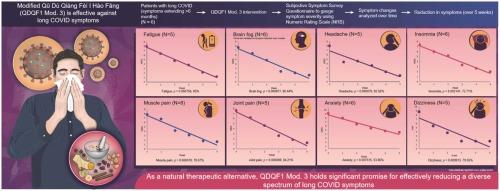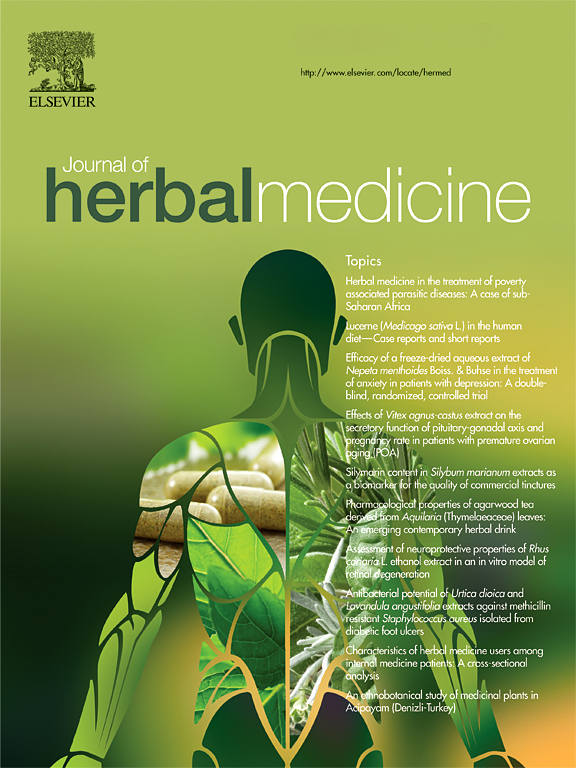评价中医药治疗新冠肺炎及长期症状的疗效:荟萃分析与回顾性研究相结合
IF 1.9
4区 医学
Q2 INTEGRATIVE & COMPLEMENTARY MEDICINE
引用次数: 0
摘要
2019年冠状病毒病(COVID-19)大流行引起了人们对长期covid的关注,其特征是持续出现疲劳、神经问题和肌肉骨骼疼痛等症状,在全球范围内构成了重大的健康挑战。方法采用荟萃分析和回顾性研究相结合的方法,探索新型COVID-19后治疗方案,包括评估中医药治疗COVID-19的疗效,以及研究治疗COVID-19长期症状的有效中药处方。根据系统评价和荟萃分析(PRISMA)指南的首选报告项目,综合数据库检索确定了评估中医药对COVID-19影响的随机对照试验(rct)。统计软件综合RCT数据,以95%置信区间(CI)计算效应大小、风险比(RR)和平均差异(MD)。回顾性研究采用严格的入选标准和5周主观症状调查问卷(SSSQ),对QDQF1 Dú Qiáng f本文章由计算机程序翻译,如有差异,请以英文原文为准。

Evaluating the efficacy of traditional Chinese medicine in treating COVID-19 and long-COVID symptoms: a combined meta-analysis and retrospective study
Introduction
The coronavirus disease 2019 (COVID-19) pandemic has brought attention to long-COVID, characterised by persistent symptoms such as fatigue, neurological problems, and musculoskeletal pain, posing a significant health challenge worldwide.
Methods
This study utilised both a meta-analysis and retrospective study methods to explore novel post-COVID treatment options, including assessing Traditional Chinese Medicine (TCM) efficacy against COVID-19 and investigating effective TCM prescriptions for long-COVID symptoms. Following Preferred Reporting Items for Systematic Reviews and Meta-Analyses (PRISMA) guidelines, a comprehensive database search identified randomised controlled trials (RCTs) evaluating TCM's impact on COVID-19. Statistical software synthesised RCT data, calculating effect sizes, risk ratios (RR), and mean differences (MD) with 95% confidence intervals (CI). The retrospective study examined clinical records of long-COVID patients treated with Qū Dú Qiáng Fèi Yī Hào Fāng Mod. 3 (QDQF1 Mod. 3), applying strict eligibility criteria and a Subjective Symptom Survey Questionnaire (SSSQ) over 5 weeks.
Results
The study demonstrated TCM's effectiveness in enhancing overall COVID-19 treatment rates and reducing neurological symptoms such as fatigue and muscle pain. QDQF1 Mod. 3 significantly alleviated long-COVID symptoms with an 85% reduction in fatigue and notable muscle pain relief, all statistically significant (P < 0.01).
Conclusion
TCM, particularly QDQF1 Mod. 3, emerges as a promising adjunctive therapy for managing both COVID-19 and long-COVID symptoms, supported by combined meta-analysis and retrospective study findings.
Data and model availability statement
Data will be made available on request.
求助全文
通过发布文献求助,成功后即可免费获取论文全文。
去求助
来源期刊

Journal of Herbal Medicine
INTEGRATIVE & COMPLEMENTARY MEDICINE-
CiteScore
3.90
自引率
0.00%
发文量
94
期刊介绍:
The Journal of Herbal Medicine, the official journal of the National Institute of Medical Herbalists, is a peer reviewed journal which aims to serve its readers as an authoritative resource on the profession and practice of herbal medicine. The content areas of the journal reflect the interests of Medical Herbalists and other health professionals interested in the clinical and professional application of botanical medicines. The objective is to strengthen the research and educational base of herbal medicine with research papers in the form of case studies, original research articles and reviews, monographs, clinical trials and relevant in vitro studies. It also publishes policy statements, opinion pieces, book reviews, conference proceedings and profession related information such as pharmacovigilance reports providing an information source for not only the Herbal Practitioner but any Health professional with an interest in phytotherapy.
 求助内容:
求助内容: 应助结果提醒方式:
应助结果提醒方式:


